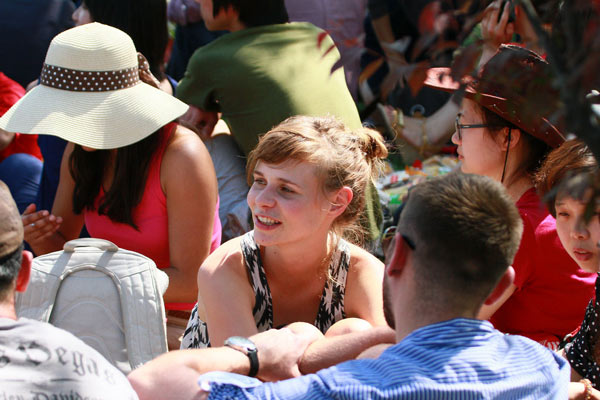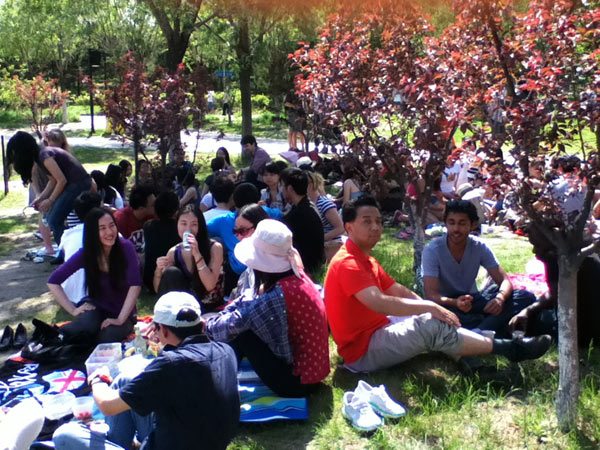 |
|
Ardent Couchsurfers Magda and Mariusz Majewski love to travel - they didn't even stay home for their wedding, which was in Fiji. [Photo provided to China Daily] |
A Polish couple brings a social network for travelers together for a springtime picnic in Beijing. Nathan Place grabs some lunch and checks it out.
As I stepped out of the Olympic Forest Park subway station, I realized the crowd was already there. It was an almost blindingly sunny afternoon, and a motley crew of puzzled but cheerful-looking people - about half Chinese, half waiguoren - was beginning to gather outside Exit A, filling the air with questions.
"Are you here for the Couchsurfing thing?" "Do you know if the organizers are here yet?" "Where are the organizers?" "Are you one of the organizers?" and "Zheshi nayige Couchsurfing huodong ma?"
It was Saturday, and all of us had read the same e-mail, one way or another, from Magda and Mariusz Majewski, a Polish Couchsurfing couple. In the past seven days, they had been to seven different cities, and here in Beijing, their third-to-last stop, they were hosting a picnic in the park for Couchsurfers. The couple just hadn't showed up yet.
I was one of those who wanted to learn. I did not have an account on couchsurfing.org, the Facebook-like website for Couchsurfers, and I had never "surfed" or "hosted" in the Couchsurfing sense. In fact, I still wasn't completely sure what these terms meant - but I soon found out.
To "surf" a couch is to stay at someone else's home, for free, while traveling in a foreign place. It doesn't necessarily mean sleeping on the couch, or even sleeping at all. As the blurb on the back of Mariusz's card says, "Stays can be as short as a cup of coffee or a few months or more."
But the key to the whole experience is that the host and the surfer are not friends or relatives; their only connection is that they are both registered members of couchsurfing.org. It's the element of trust between two strangers that makes Couchsurfing special.
I could see that trust in the faces around me. Almost none of us knew each other, but there was warmth and the crowd was easy-going. Total strangers were talking and meeting each other; young Chinese people were practicing their English; there was even a Belgian couple happily seizing an opportunity to speak French with a Chinese student who spoke it fluently.
The atmosphere was overwhelmingly friendly, even though hardly any of the people in it were friends.
Eventually we meandered our way into the park and found a beautiful spot by the lake. We sat down in groups of five or six people, each with its own picnic blanket, food, wine and other supplies. Each group was a kind of microcosm of the Couchsurfing slogan, "the world is smaller than you think".
In my group alone, there were people from China, the United States, Russia, France and Benin.
Finally, Magda and Mariusz showed up with their two adorable children, Max, 4, and Marta, 2. When they weren't too busy, I asked them a few questions about Couchsurfing.
They were the right people to ask. The two of them are committed devotees of the Couchsurfing lifestyle. They've owned a joint Couchsurfing account for five years, they're the designated Couchsurfing Family Ambassadors in Warsaw, and Mariusz's profile boasts that he's been to all 194 countries in the world.
So why do they Couchsurf? "It's a way to travel besides just watching the four white walls of a hotel room," Mariusz said. "Instead, you can see how (local) people live."
"Couchsurfing is not just about sharing couches," added Magda. "It's also about meeting people." Many members of the network are singles and couples, but they have found many families who like the idea, too.
 |
|
More than 200 social travelers gathered in Beijing's Olympic Forest Park for a picnic last month. The Majewskis have organized dozens of meet-ups for people interested in Couchsurfing, especially for families who want to travel and meet locals wherever they go. [Photo provided to China Daily] |
But do Chinese people do it? I was impressed by the number of Chinese attendees, but almost every one of them I talked to said they were just there to enjoy the weather, make friends, and practice their English.
One man, whose English name was "Skip," told me he had never Couchsurfed either in or outside of China, but had used his membership on the Couchsurfing website to join outdoor activities with foreigners, such as camping on the Great Wall.
If Chinese people don't "surf" much, they seem to enjoy being hosts. In Beijing alone, 2,172 people offer their homes to Couchsurfers on the website. Meanwhile, it seemed like everyone at the picnic had a story about how incredibly hospitable a Chinese host had been to them.
Olga Komarevtseva, from Russia told me how curious her hosts had been about Russian culture, while Mariusz told me about the time one host drove out at 11:30 pm to pick him and his family up from the airport.
Eventually the sun started going down, and the crowd began to thin out. A group of friends I had met - hailing from Germany, Russia, Latvia, India and Japan, among other places - was going to Wangfujing to try the scorpions, and they invited me along.
As I left with them, I gradually realized they were not old friends at all, but had met each other mostly that day at the picnic. I spent the rest of the day doing exactly what Couchsurfing is all about: wandering in a foreign place with friendly strangers.
Contact the writer at [email protected].
 |
